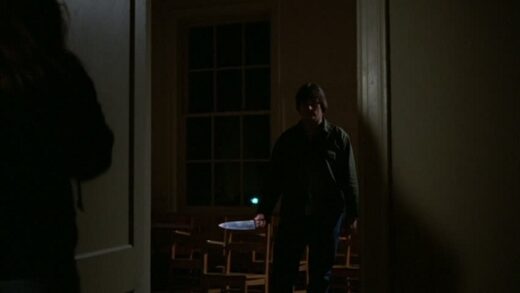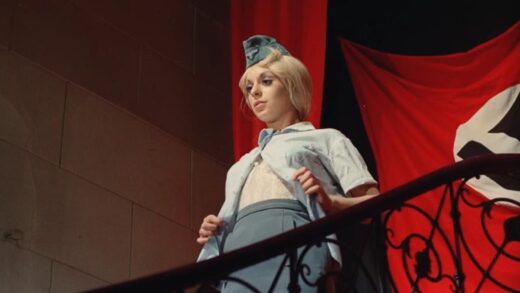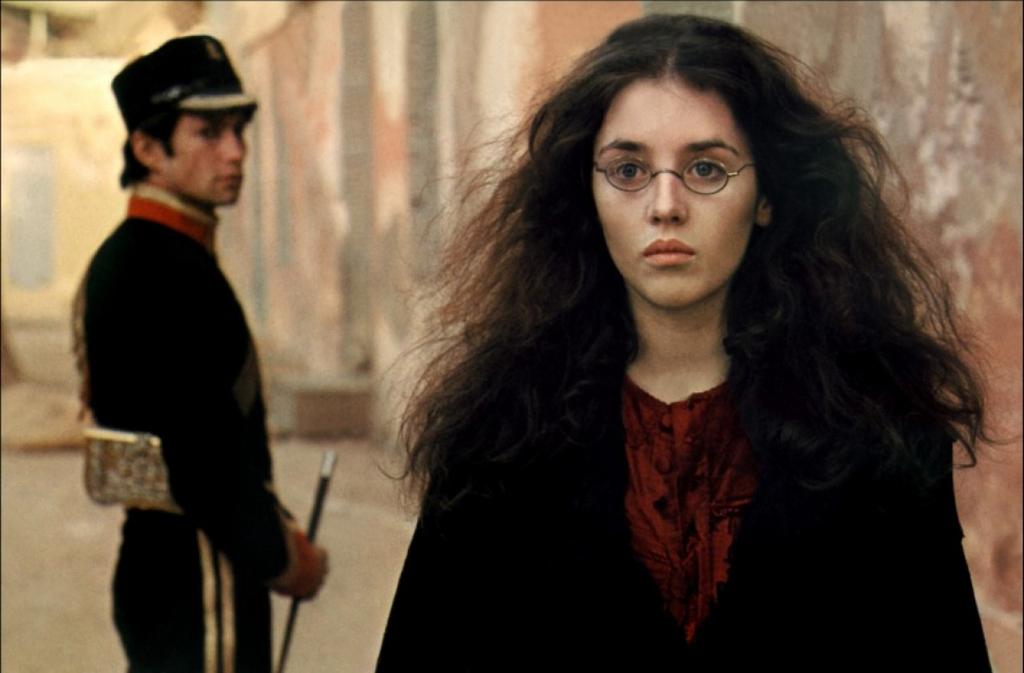Point Break (1991)
![]()
Point Break (1991) Directed by Kathryn Bigelow
Are you radical, Brah?! If you are then there’s a good chance you’ll connect with the pop-philosophy vibe of this cockamamie slice of 90’s popcorn action. And if you’re not, there’s still a good chance you’ll at least sympathize or end up embracing its rhetoric of macho bravado, because if Kathryn Bigelow’s Point Break is exceptional at one thing, it’s convincing you that the human spirit is still alive. A female filmmaker – and not just a female director, but the finest female director working in the American film industry at the time – helming a moderately big-budget studio picture about foolhardy men being men, absurdly manly characters with plenty of testosterone to be willing to die just to get their daily dose of adrenaline. The result is flat-out nirvana. Bigelow offers the most androcentric perspective on action filmmaking ever imagined through an empirical female lens; her cinematic flair seeks out the cool, rough-hewn male experience with a simple but rewarding gimmick, and that is to let her male characters be.
Bigelow doesn’t judge with her camera the irrationality of her characters’ macho instincts; she just observes them and grants them the sovereignty to do what they want. And as in any anarchy, accidents occur, and tragedies trigger a string of unforeseeable vicissitudes with lethal consequences; but that’s what the characters in Point Break pursue with their hedonistic libertinism. Bigelow never betrays these ideals, because that would be to bamboozle her audience with a moral tale and on an intellectual plane would be to compromise the anarchic heart of the film. Bigelow’s female psyche depicts male temerity as she perceives it, unvarnished and unadulterated, understanding and extolling masculine codes as Howard Hawks did in his classic buddy flicks. But Point Break has a romantic twist that makes it genuine in its lyrical panorama of life-threatening activities; each character’s ritualistic quest for adrenaline is rendered poetic by Bigelow’s romantic handling of the thrilling affairs.
Right out of the bifurcated opening credits, Point Break kicks off its intrepid mythology, everything else that follows is an ode to it. On the one hand, Johnny Utah (Keanu Reeves) is a rookie FBI agent who is assigned to partner up with seasoned and crotchety FBI agent Angelo Pappas (Gary Busey) to investigate a series of bank robberies in Los Angeles. On the other hand, we have Bodhi (played by Patrick Swayze, one of the best, if not the coolest, of his performances), a vigorous surf-loving pseudo-philosopher and a dedicated critic of the stodgy status quo. He and his gang are dedicated to robbing banks wearing masks of former American presidents – oh the irony – and reveling in life as if every day were their last. On a comparative standpoint, Utah’s formality and Bodhi’s informality are radical contrasts, but when Utah as an undercover agent joins this death-defying crew – he learns to surf, and adjusts to Bodhi’s easy-going, Buddhist lifestyle – Utah gradually forges a special relationship – almost spiritual – with this adventurous, free-living guru to the extreme extent of challenging his entire existence. Utah has never felt such a degree of ecstasy as he does every time he is out in the ocean riding waves with Bodhi. In his undercover assignment as an agent he also meets Bodhi’s ex-girlfriend Tyler (Lori Petty), a pretty surfer he falls in love with and becomes his private surf instructor. Utah is supposed to apprehend these guys, but his reformed ethics preclude him from putting them behind bars; the vacillation soon morphs into a metaphor where locking them up would be like pulling the wings off a bunch of free birds.
When we least expect it, Utah is already part of this gang, even if he doesn’t realize it yet. Bodhi leads an edgy, itinerant and perilous lifestyle, and just as Utah sees in him a reflection of all that he admires but refuses to acknowledge, Bodhi sees in Utah a variation of himself ensnared in the phony comforts of society; he wants to rescue him…to instruct him how to live, and that’s what Utah eventually learns from his torrid camaraderie with Bodhi. At exactly the same moment that Mark Isham’s mystical score turns the Californian coastal landscape into an ode to male fearlessness, the panoramic romanticism of Bigelow’s camera suggests that it is a celebration of life itself.
At the time of Point Break’s release in 1991, Patrick Swayze was already a movie star – People magazine called him “the sexiest man alive” – and his career was at the pinnacle of its popularity. If his audience recalls him most for his eloquently corny role in Jerry Zucker’s Ghost, sharing the screen with Demi Moore in one of the fleshliest romantic scenes of ’90s cinema, the hell with it! Swayze’s Bodhi philosophizing about the human spirit is the finest thing he has done in his career and the unequivocal reason why he should be fondly remembered. Bodhi is one of the coolest characters ever written and put on the big screen. And Swayze brings him to fruition with unparalleled impassioned bravura and vigor. Prior to this film, Swayze was often portrayed as a model not an actor – by this I don’t mean he wasn’t terrific in his pre-Point Break roles – my intention is to redeem him as a movie star capable of playing characters that require more than just muscle-bound vanity and a pretty countenance. Swayze displays a wide, extremely wide range of emotions in his portrayal of Bodhi, who is a complex character, insightful and uncompromising in his philosophy of life. When we watch Swayze in Point Break, we don’t witness Swayze playing Bodhi, we witness Swayze possessing Bodhi. It is the crowning achievement of his genius. It is an intimate performance, you can practically sense that Swayze found in Bodhi something so deeply personal that he appropriated this character as if he had been written exclusively for him to play it. Bodhi is a poignant character despite his gruffness and addictive pursuit of wild escapades because Swayze reveals through Bodhi’s daredevil behavior that life is a risky adventure worth living.
The film works so smoothly that the running time is imperceptible even in the scenes of unavoidable popcorn ordinariness, it’s a grand time at the movies. Kathryn Bigelow keeps her film moving at breakneck pace – the impeccable camerawork is so hyperactive that I don’t recall a single static shot in the entire film – it’s as if her filmmaking as well as Utah is also beguiled by the stirring, dauntless ethos of the male characters. Bodhi lectures Utah that life is like the waves and that motion is the current he must flow with. Is it the same filmmaking philosophy that Bigelow opts for in this film? Be that as it may, the hectic, fast-paced audiovisual orchestration of Point Break reveals that the camera is inextricable from the metaphysics of mise-en-scène. For two hours of exhilarating cinema, even with its gaudy bits of photographic splendor and idyllic romance, the film doesn’t let up. The uniformity of Point Break is sustained by the audacity of its structure, which never loses its complex sense of constant movement. Bigelow knows how to compose restless sequences remarkably well; she has the religious patience to understand when to speed up the action shot by shot and when to slow it down to dramatize a specific moment. The grueling, magnificent scene of Utah relentlessly pursuing Bodhi is a masterful exemplification of Bigelow’s keen eye for orchestrating rhythmic desperation and sweaty set pieces in a shifting but always assured style.
The payoff is one of the most inexplicably inspiring films I’ve ever seen. An ode to masculine intrepidity and the human spirit. For these characters, if they die in the pursuit of the craziest extreme enjoyment, they will have died in peace. Swayze vibrates in the role of Bodhi, Reeves is ridiculous in the role of Utah, but the two of them in the same frame are ecstasy and rhapsody making unforgettable a film as elemental as it is transcendental. The waves that Bodhi and his adventurous friends ride are a perfect metaphor for the unpredictability of their lifestyle. And well, danger as a dose of freedom has never been as seductive as it is here and dying doing what you love has never been as literal as it is in Point Break.






